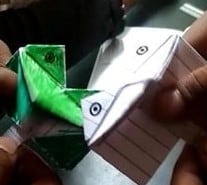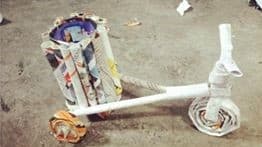“Hello Teacher, kis ka accha hain? Mera ya uska?”
“Mera, Mera”
(Hello Teacher. Whose toy is better – hers or mine?” “Mine, Mine”)

Two paper frogs, one green and one white, talking to one another animatedly. The voices in the background belong to children.
A joyful WhatsApp forward on a Sunday morning led us to pursue this heartwarming story of children in the bastis crafting puppets to beat the stress brought on by COVID-19.
The lockdown has placed enormous economic burden on the urban poor. There is a palpable gloom produced by a normal way of life coming to a sudden screeching halt. Children in informal settlements are especially vulnerable during this time. Schools have shut down indefinitely. The dusty fields that the children used as their playgrounds are eerily empty.
With few families having the luxury of access to mobile phones, television sets or internet connections, children in the bastis are cooped up in their small homes together with despondent adults. They are thus coping with an unspoken fear and unease. Most are left on their own to deal with the troubling things they are seeing and hearing.
In M East ward there is an attempt to reach out to this vulnerable group through a series of engaging learning activities. Srishti Jaitley of the Transforming M Ward Project along with the centre managers of the project’s education division – the Saksham Study Centres – has found creative ways of keeping the students occupied for a few hours each day. The idea is to ensure that children continue with schoolwork and at the same time, learn through a bit of creativity. All this using smartphones and WhatsApp.
Borrowing from the teachings of Arvind Gupta—a popular toy inventor and scientist—one of the initiatives is aimed at turning everyday waste materials into inventive toys. “The process assists children across age groups to innovate with and place value on recyclable material,” Bindu said. Bindu is the centre manager at the Indira Nagar basti, the settlement where the initiative has received the maximum response.
“At a time like this, when there is fear and no one is certain what is going to happen next, I am really pleased that my daughter is able to engage regularly in some assignments and also use the time she has creatively,” said Zeba the mother of fourteen year-old Saiba, a student at the Indira Nagar centre.
Saiba feels she is one of the luckier children in her settlement and values the time she gets to engage with the activities that the study centre teachers are sending her parents on WhatsApp. “Not everyone’s parents have a smartphone here and some that do are using it sparingly to conserve data,” she said, adding that she was happy that her mother was giving her an hour and a half a day on the family’s only mobile set to carry out her school work.
“It’s nice to make these toys and paper puppets, it becomes a bit of contest with my sister and with the other students that I would normally see at the study centre,” said Aryan Yadav a fourteen-year-old whose younger sister Rhea insisted that her paper puppet was better than his.
“At a time like this, when there is fear and no one is certain what is going to happen next, I am really pleased that my daughter is able to engage regularly in some assignments and also use the time she has creatively”
mother of 14-year-old Saiba, Indira Nagar Basti

Students have been writing reflective essays and painting pictures on what the lockdown has been making them think about and the things that they miss being able to do.
While lack of access has resulted in limited participation at the moment, Khuresha (a teacher at the Indira Nagar centre) said that she thinks a lot of the activities could just as easily find their way into the curriculum of students even in ‘normal’ circumstances. “Learning how to use waste material to make toys and encouraging students to write reflective essays has been great.”
She feels like she is getting to know students she would normally see everyday even better. “Of course the hope is that normalcy resumes at the earliest. In the interim, however, we are doing our best to ensure that participation increases,” she concluded.
This is republished with permission from ‘Stay Involved, Get Involved’, a series of stories on community driven and community oriented, bottom-up practices to deal with the COVID 19 situation in Mumbai. The original series was published on BlogURK: Reimagining Cities in the Global South
The stories were tracked by the TISS COVID 19 Response team and edited by Dr Ratoola Kundu, Chairperson and Assistant Professor, Centre for Urban Policy and Governance (CUPG), TISS. The team may be reached at ratoola@gmail.com or at 9867435125.